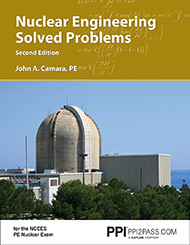Nuclear Engineering Solved Problems
Availabe in Print or eTextbook
John A. Camara, PE's Nuclear Engineering Solved Problems will help you identify important nuclear engineering concepts as defined by the NCEES nuclear PE exam specifications.
This book’s comprehensive coverage of nuclear engineering problem-solving will sharpen your understanding of nuclear energy and engineering whether you are a candidate for the nuclear PE exam, a nuclear plant operator or technician, a professional in the health physics field, or a nuclear power worker in military or civilian settings.
Key Features & Benefits:
- Exam-like, multiple-choice problems prepare you for the exam’s problem format.
- Supplemental tables, equations, diagrams, and other data allow for solving of problems without additional references.
- Detailed solutions explain efficient, accurate methods to solving problems, while identifying common errors to avoid.
- Thorough review of the problem statements, solutions, and supplemental information provides a broad overview of the field of nuclear engineering.
- One year of access
- Ability to download the entire eTextbook to multiple devices, so you can study even without internet access
- An auto sync feature across all your devices for a seamless experience on or offline
- Unique study tools such as highlighting in six different colors to tailor your study experience
- Features like read aloud for complete hands-free review
FAQs
Some states require a BS degree from an ABET-accredited engineering program to sit for the PE exam. Other states allow you to take the PE exam with a degree in engineering technology, physics, math, or chemistry—or without any degree—as long as you’ve met the required work experience. Check your state requirements to see if you can take the PE exam without an engineering degree.
Most states allow you to take the PE exam after passing your FE exam and gaining at least four years of post-college work experience. However, some states now allow examinees to sit for the PE exam before completing their work experience. Check your state requirements to see when you’re qualified to sit for the exam.
The PE exams are not considered easy to pass, but the exam will become easier if the content reflects topics that you're familiar with from your current line of work. Think about your career goals when considering the PE exam. Are you seeking a promotion in your current role? You should select the exam that best supports your current career. Are you trying to switch industries? Choose the exam that will set you up for success in your new field. Rather than seek out the easiest PE exam, select the one that will support your goals.
